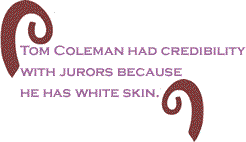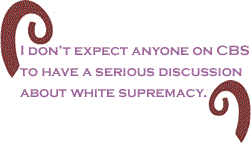| |
|
|

|
“Thanks
to everyone that was with us all the way. I was blessed not to go to jail. I just
want to say thanks again. And God bless you all.” – Tonya
White e-Mail to TalkLeft.com.
 Tonya
White is a very lucky woman. Ms. White lives in Tulia, Texas
but she was in a bank in Oklahoma City, Oklahoma at the same
time she was accused of dealing drugs in Tulia. Tonya
White is a very lucky woman. Ms. White lives in Tulia, Texas
but she was in a bank in Oklahoma City, Oklahoma at the same
time she was accused of dealing drugs in Tulia.
The
terrible injustice perpetrated
on residents of Tulia, Texas is not a new story. Forty-six
innocent individuals, 39 of them black, were arrested,
tried and convicted for drug dealing, solely on the word
of former police officer Tom Coleman. Coleman is now under
indictment for perjury.
Here
in New York City crooked cops find it necessary to plant
evidence in order to win convictions, but not so in the
Texas panhandle. Coleman had no evidence, not wire taps,
videotapes or even the drugs that had allegedly been sold.
Yet he succeeded in getting sentences of up to 99 years
in these cases.
I first
read about the Tulia case in Bob Herbert's New York Times
column. Attorneys in Texas, New York, and Washington, many
of them volunteers, were all part of the successful defense
effort. The result is that all of the defendants have been freed and
35 have been pardoned by the governor of Texas.
I
watched a story about Tulia on the September 28th season
premier of 60
Minutes and it was truly painful to revisit. Some
of the cases were dismissed because the accused were able
to prove they were at work or, like Tonya White, not in
Tulia during the alleged drug dealing. One defendant, Joe
Moore, is a pig farmer living in what I can only describe
as a shack. That alone should have been evidence that he
wasn't a drug dealer. I always thought that drug dealers
plied their trade to avoid living in shacks.
Correspondent
Ed Bradley interviewed Coleman in an exchange that was both
frightening and comical. Coleman was defiant but kept addressing
Ed Bradley as "Sir." The former cop admitted using
the word nigger many times but when asked if he would address
Bradley that way he replied, “Oh, no sir, not you.” He still
maintains that the defendants were drug dealers, even when
presented with Tonya White’s proof of being in Oklahoma.
The strangest question from Bradley was, "How has this
affected your life?" Tom Coleman is not yet behind bars.
Because of his actions 46 people were imprisoned unjustly
and lost their freedom for more than three years. I hope
I was not the only viewer who wasn't concerned about Coleman’s
life. But surprisingly, this segment was not the most disturbing
portion of the broadcast.
Bradley
spoke with Elaine Jones of the NAACP Legal Defense Fund,
whose attorneys played a key role in overturning the convictions.
Ed Bradley asked a very predictable question, "How
did this happen?" Ms. Jones stated the obvious when
she said, “The defendants in Tulia are guilty of being
Black and living in Tulia.” She went on to say that the
town was too small to have a market for drug dealing on
such a scale, and also blamed the excesses created by the
war on drugs.
My
initial reaction to Ms. Jones’ statement was that such
a heinous injustice required more than a matter of fact
explanation about population size and overzealous bureaucracy.
But in fairness to Bradley and Jones, I am sure that their
conversation was much longer than the snippets shown to
viewers. They may have discussed the nature of racism,
the farce that is the war on drugs, and how that led to
Tulia and other cases of police and judicial misconduct.
Elaine Jones and her colleagues who worked on this case
could tell us all a lot more if they were not constrained
by the need to allow time for real news, advertisements,
and the genius of Andy Rooney.
However,
the rest of us are under no such restrictions and should
use these much needed if incomplete news reports as an opportunity
to speak honestly about Tulia and other injustices. The sad
truth is, these convictions occurred because of white supremacy.
Tom Coleman had credibility with jurors because he has white
skin. He didn't need wiretaps or fingerprints. A white face
declaring black guilt was sufficient evidence to get prison
sentences for non-existent crimes.
Talking
about white supremacy takes a lot longer than sixty minutes
and is difficult for people of every race to acknowledge.
It is easy to call a member of the Aryan Nation or KKK
a white supremacist. They give us an out by publicly embracing
their beliefs. But what do we say about physicians who
treat white and black patients differently, or the loan
officers who refuse mortgages to blacks and Hispanics who
have the same income as whites?
The
words white supremacy are so loaded, and conjure up such
horrible images that it is no surprise most people aren’t
willing to own them, even as they reject the more qualified
job applicant or hire him but pay less than he deserves.
The pain it causes is so terrible that even victims are
in denial. As Tulia defendant Freddie
Brookins Jr., said, "I
can't just dwell on being angry. If I stay upset about
it, I can't go on with my life.” Most of us have not had
his experience, and yet his words are familiar. We acknowledge
racism but don’t dwell on it too much because we want to
live our lives without anger and bitterness.
But
we are still angry and bitter. We waste time asking questions
that more often than not have an obvious and simple answer. “Why
am I followed around in the store?” Answer: white supremacy. “Why
does the world stop brutality in Bosnia but not in the
Congo or Liberia?” Answer: white supremacy. “Why doesn’t
Angela Bassett get more and better roles?” Answer: white
supremacy. I could go on with important and unimportant
issues alike but you get the idea. When these questions
arise we should take a deep breath, count to ten and then
say, “White supremacy.” The initial discomfort will be
overcome by a feeling of freedom. Our circumstances may
not be any different, but the willingness to tell the truth
will be liberating.
People
of color are imprisoned unjustly, victimized by police
brutality, die earlier than they should and are excluded
from the opportunities this country has to offer, all because
of a belief that white people are superior and more deserving
than non-whites. It seems that this belief also causes
otherwise worthy sources of information to address even
the most egregious examples of racism in a superficial
manner. I don’t expect anyone at CBS to have a serious
discussion about white supremacy, but I would have thought
that a more in-depth analysis would take place in telling
the story of Tulia. It didn’t happen. The reasons are obvious.
This
is the first Freedom Rider column written by Margaret Kimberley. It
will appear weekly in  . Ms.
Kimberley is a freelance writer living in New York City. She
can be reached via e-Mail at [email protected]. You
can read more of Ms. Kimberley's writings at http://freedomrider.blogspot.com/ . Ms.
Kimberley is a freelance writer living in New York City. She
can be reached via e-Mail at [email protected]. You
can read more of Ms. Kimberley's writings at http://freedomrider.blogspot.com/
|
| |
|
|
|
|





